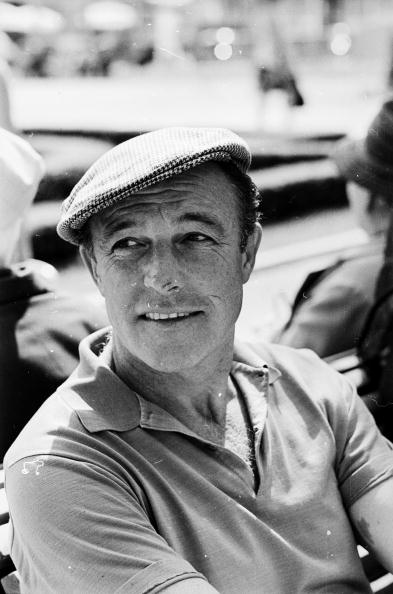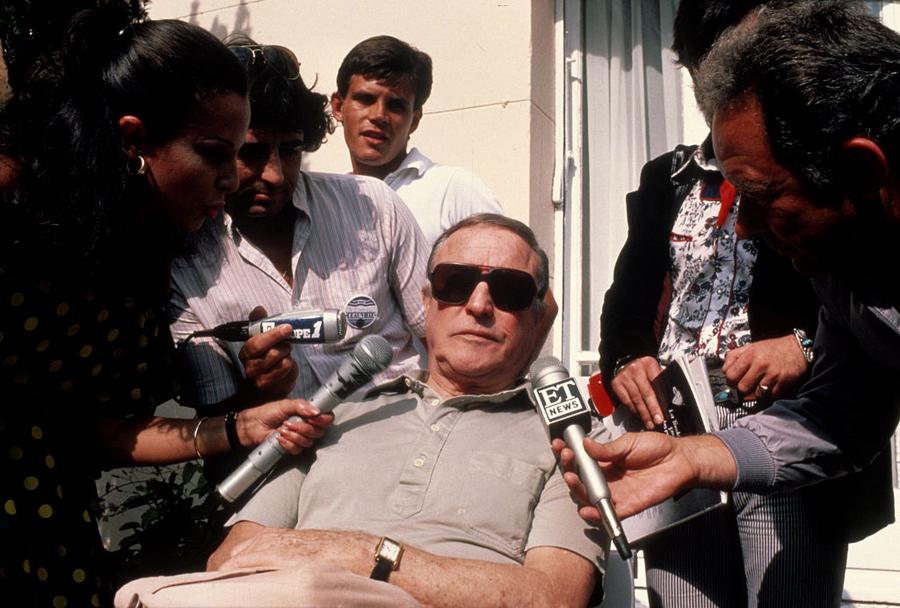What Was Gene Kelly's Net Worth?
Gene Kelly was an American dancer, actor, singer, director, and choreographer who had a net worth of $10 million at the time of his death in 1996. That's the same as around $20 million in today's dollars. Gene Kelly was best known for his muscular and athletic dance style and for creating forms of dance that were entertaining to the public at large. His best-known films are "An American in Paris," which won six Academy Awards (including one for Best Picture), and "Singin' in the Rain," which he directed and choreographed alongside director and choreographer Stanley Donan. Kelly has been ranked as one of the top 15 male screen legends of classic Hollywood cinema.
Early Years
Eugene Curran Kelly was born on August 23, 1912, in Pittsburgh, Pennsylvania. He was one of five children born to phonograph salesman James Kelly and his wife, Harriet (Curran). When Kelly was eight, his mother enrolled Gene and his siblings in dance classes. When neighborhood boys discovered this, bullying and physical fights ensued. Kelly refrained from dancing again until he was 15 years old and instead engaged in baseball.
Gene attended St. Raphael Elementary School in Pittsburgh and graduated from Peabody High School, a public school in the Pittsburgh neighbored of East Liberty. He then enrolled at Pennsylvania State College, majoring in journalism but soon had to drop out to help his family financially when the Wall Street Crash of 1929 crippled the United States.
In 1931, Kelly enrolled at the University of Pittsburgh, majoring in economics. He became a member of the Theta Kappa Phi fraternity and joined the Cap and Gown Club, which focused on theatre arts and musical productions. After his 1933 graduation, Gene was admitted to the University Of Pittsburgh School Of Law. He served as director of the Cap and Gown Club from 1934 to 1938. He also taught at the dance studio his family had opened, and from 1931 to 1938, he taught dance at the Beth Shalom Synagogue in Pittsburgh.
Kelly dropped out of law school after two months to pursue a career in the performing arts. He went to New York in search of opportunities and, finding none, returned to Pennsylvania and began working as a choreographer at the Pittsburgh Playhouse.
Military
Kelly was inducted into the United States Navy in 1944 and was commissioned as a lieutenant, junior grade. Stationed in Washington, D.C., he took part in the writing and direction of several government documentaries. He was discharged from the military in 1946.

Getty Images
Theatre
Kelly's first theatre performance was in the 1938 musical "Leave It to Me!," which is based on the play "Clear All Wires" by Samuel and Bella Spewack. He played the secretary to Mr. Goodhue and sang in the chorus of the show, which was presented at the Imperial Theatre on Broadway.
In 1939, Gene served as part of the ensemble of "One for the Money" at Booth Theatre on Broadway. The following year, he starred as Joey Evans, a womanizer who dreams of owning a nightclub, in "My Pal Joey" performed at the Ethel Barrymore Theatre and the St. James Theatre, both on Broadway.
Kelly choreographed "Best Foot Forward" at the Ethel Barrymore Theatre in 1941 and directed "Flower Drum Song' – based on the 1957 novel by C.Y. Lee – at the St. James Theatre on Broadway in 1958. In 1979, he produced "Coquelico" at 22 Steps, a venue in New York City.
Television
Kelly appeared in the 1957 anthology series "Schlitz Playhouse of Stars" as Tom. T. Triplet. The next year, he choreographed the NBC educational documentary "Dancing is a Man's Game."
From 1962 to 1963, he played Father Chuck O'Malley in 30 episodes of "Going My Way," a comedy-drama series based on the 1944 film of the same name, which starred Bing Crosby.
Kelly appeared as himself in numerous television productions, including the sketch comedy-drama "The Funny Side" in 1971, "Magnavox Presents Frank Sinatra" in 1973, the animated live-action special "Yabba Dabba Doo! The Happy World of Hanna-Barbera" in 1977, the sitcom variety show "The Mary Tyler Moore Hour" in 1979, and the variety sketch comedy series "The Muppet Show" in 1981.
In 1985, Gene played Senator Charles Edwards in the Civil War miniseries "North and South" based on the novel trilogy by John Jakes. The following year, he played Eric Hovland in the miniseries "Sins," starring American actress Joan Collins.

Gene Kelly circa 1982. (Photo by Sonia Moskowitz/IMAGES/Getty Images)
Film
Kelly made his film debut in 1942 with Judy Garland in the musical "Me and My Gal." He played Harry Palmer, a vaudeville actor drafted into military service. He co-starred with Garland again in the musical "The Pirate" in 1948 and "Summer Stock" in 1950. Due to personal issues Garland was going through at the time, she was fired by the movie studio after this film.
In 1960, Kelly played E.K. Hornbeck in the drama "Inherit the Wind," based on the 1955 play of the same name by Jerome Lawrence and Robert Edwin Lee. In 1969, he directed the musical "Hello, Dolly!" starring Barbara Streisand and Walter Matthau. The film was nominated for an Academy Award for Best Picture.
Radio
Gene performed in a handful of radio programs, including two episodes of "Suspense Mystery Radio Play" in 1943 and 1949, and "Hollywood Players" in 1946.
Awards
During the 1940s, Gene won a Best Actor Award from the National Board of Review for his performance in "Me and My Gal" and earned an Academy Award nomination for Best Actor for his performance in "Anchor's Aweigh."
Kelly's accolades of the 1950s include a Golden Globe Award nomination for Best Actor in a Motion Picture Musical or Comedy for his role in "An American in Paris," an Honorary Academy Award for his career achievements (which was destroyed during a 1983 fire that burned down his mansion and was replaced at the 1984 Academy Awards), a Best Director Award nomination from the Directors Guild of America for his direction of "Singin' in the Rain," a Golden Laurel Award nomination for Best Male Musical for "Les Girls," and an Emmy nomination for Best Singing for "Dancing is a Man's Game."
Gene was honored with a star on the Hollywood Walk of Fame in 1960, a 1964 Best Actor Award for "What a Way to Go!" at the Locarno International Film Festival, and a 1967 Emmy for Outstanding Children's Program for "Jack and the Beanstalk."
In 1970, Kelly was nominated for a Golden Globe Award and a Directors Guild of America Award for Best Director for "Hello, Dolly!"
During the 1980s, he won a Cecil B. Demille Award at the Golden Globe ceremony and Lifetime Achievement Awards from the Kennedy Center Honors, the American Film Institute, and the Screen Actors Guild.
Kelly was inducted into the American Theatre Hall of Fame in 1992 and was awarded a National Medal of Arts by United States President Bill Clinton in 1994.
At the 1996 Academy Awards ceremony, a memorial tribute was performed in honor of Kelly, who had recently died. The American Film Institute named him the 15th greatest male screen legend of classic Hollywood cinema in 1999.
Personal Life
Gene married American film and stage actress Betsy Blair in 1941. They divorced in 1957, and he then married American Broadway dancer and choreographer Jeanne Coyne in 1960. Coyne died in 1973, and in 1990, Kelly married Patricia Ward.
Gene had three children, Kerry (born in 1942), Timothy (born in 1962), and Bridget (born in 1964).
Death
During the summer of 1994, Kelly suffered a stroke and spent seven weeks recuperating at the Ronald Reagan UCLA Medical Center. The following year, he suffered another stroke, which severely disabled him. Gene died on February 2, 1996, at the age of 83, in Beverly Hills, California. A collection of his papers is housed at the Howard Gotlieb Archival Research Center at Boston University in Massachusetts.
/2014/06/Gene-Kelly.jpg)
/2015/06/fred-astaire-1.jpg)
/2022/06/Jack-Lemmon.jpg)
/2015/06/GettyImages-3072409.jpg)
/2017/05/James-Stewart.jpg)
/2015/08/Ginger-Rogers.jpg)
/2020/02/melissa-rivers.jpg)
/2020/11/Yella-Beezy.jpg)
/2020/08/cusack.jpg)
/2023/08/richard-dawson.png)
/2011/08/Doug-Hutchison.jpg)
/2010/07/GettyImages-80351333.jpg)
/2021/01/oldman.jpg)
/2012/11/GettyImages-470080838.jpg)
/2009/12/Mario-Lopez-1.jpg)
/2014/07/GettyImages-688457574.jpg)
/2023/04/Benny-Blanco.jpg)
/2014/06/Gene-Kelly.jpg)
/2015/06/fred-astaire-1.jpg)
/2022/06/Jack-Lemmon.jpg)
/2015/06/GettyImages-3072409.jpg)
/2019/10/Jonathan-Groff.jpg)
/2014/12/jf.jpg)
/2021/02/shirley.jpg)